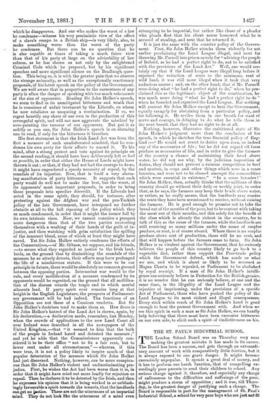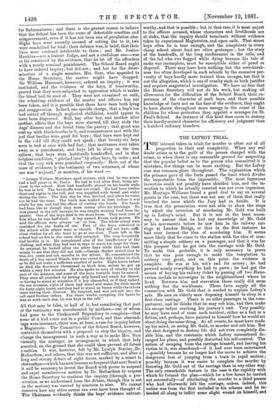THE ST. PAUL'S INDUSTRIAL SCHOOL.
TEE London School Board was on Thursday very near making the greatest mistake it has made in its career. The Board has been a success, and gets through an extraordi- nary amount of work with comparatively little friction, but it is always exposed to one grave danger. It might become excessively unpopular. It spends a great deal of money, and it has to perform one harsh function, that of compelling ex- ceedingly poor parents to send their children to school. Any serious charge against it, therefore, and especially any charge of callousness to the difficulties and sufferings of the poor, might produce a storm of opposition ; and it was, till Thurs- day, in the greatest danger of justifying such a charge. The Board is responsible in part for the management of St. Paul's Industrial School, a school for very poor boys who are just not fit
for Reformatories ; and there is the gravest reason to believe that the School has been the scene of detestable cruelties and misgovernment, even if it has not been one of peculation also. Eight boys were recently accused of setting fire to it, two were committed for trial; their defence was, in brief, that their lives were rendered intolerable to them ; and Mr. Justice Hawkins—not a lenient Judge, and not a credulous one—was so far convinced by the evidence, that he let off the offenders with a nearly nominal punishment. The School Board ought to have ordered inquiry, but did not ; and but for the deter- mination of a single member, Mrs. Surr, who appealed to the Home Secretary, the matter might have dropped. Sir William Harcourt, however, ordered an inquiry ; it was instituted, and the evidence of the boys, if trustworthy, proved that they were subjected to oppression which it makes the blood boil to read of. They were not examined on oath, the rebutting evidence of the master and officers has not been taken, and it is possible that there have been both lying and exaggeration. Indeed, one specific charge, that a boy's toe had rotted off through neglected chilblains, would appear to have been disproved. Still, boy after boy, and mother after mother, affirm that the boys were starved, till they stole the dogs' dinners and the bread from the pantry ; that gruel was -sent up with black-beetles in it, and remonstrance met with the jest that beetles were good for boys ; that boys were kept out in the cold till they could not speak ; that twenty-six boys were in bed at once with bad feet ; that mattrasses were taken away as a punishment, and boys left to sleep on the iron -splines; that boys were habitually handcuffed, and in that helpless condition, "pitched into" by other boys, by order ; and that the very sick were punished corporally: Here, out of the mass of evidence, is the testimony of two witnesses, of whom -one was " serjeant," or monitor, of his ward :—
"George William Mortimer, aged sixteen, said that he was seven and a half years in St. Paul's. He had to look after Rust, being ser- jeant in the school. Rust bad handcuffs placed on his hands while he was in bed. The handcuffs were too small. He had been twelve • days and nights in the cell, and was supplied with bread and water during the time. The first day he was birched, and when he came out he had the cane. The birch was soaked in lime before it was ready for use, and had the effect of cutting the hands. His hands had been like as though they were rotten after his birchings. He was placed in the cell because he was caught stealing food from the pantry. One of the boys died in the store-room. They took care of him when he was half-dead. A boy named Evans took poison. He said the officers were always on' to him. The whole school were punished for the faults of one. Part of the boys remained in the school while others went to church. They did not have suffi- cient clothes for all the boys to go at one time. Those left in the --achool had no fire in the room they occupied. The soup frequently had beetles in it. He complained also of the insufficiency of the clothing, and what they had was in raga or much too large for them. As serjeant, be looked after the other boys while they had their -meals, to see that they did not talk.—George Barber stated that he was live years and ten months in the school. He remembered the death of a boy named Winch, who was caned the day before he died, as he did not make a sufficient namber of sacks. Eight hours before he died, the Governor threatened to birch him, unless he got up within a very few minutes. He also spoke to acts of cruelty on the part of the masters, and some of the boys towards boys he named. They were all punished by having only bread and water for dinner, ,or having to stand at attention if a boy absconded, or if they talked. On one occasion, eight of them had bread and water for their meals for forty-eight hours, and they had to stand on forms while the others were having their dinners. He laughed, and was ordered into the cell until further orders. For three weeks, excepting the hours he was at work each day, he was kept in the cell."
-All that may be false, or half of it, bat considering that part of the testimony was corroborated by mothers—one of whom had gone to the Clerkenwell Stipendiary to complain—that some of it had c3me out in a public Court, and that abscond, ings were incessant, there was, at least, a case for inquiry before a Magistrate. The Committee of the School Board, however, contented themselves with a proposal to stop the inquiry, and -.change the management in such a way as to make Mrs. Surr wirtually the manager, an arrangement to which that lady aasented, on the ground that she could then prevent all future cruelties. It was, however, felt by Mr. Lyulph Stanley, Dr. Richardson, and others, that this was not sufficient, and after a long and stormy debate of eight hours, marked by a resort to obstruction—which has now become so frequent that next Sessicn it will be necessary to invest the Board with power to suspend and expel members—a motion by Dr. Richardson to request the Home Secretary to continue the inquiry (through a pro- -secution, as we understand from the debate, though this is not in the motion) was carried by nineteen to nine. We cannot conceive how any other course can ever have been thought of. The Chairman evidently thinks the boys' evidence untrust- worthy, and that is possible ; but in that case, it is most unjust to the officers accused, whose characters and livelihoods are at stake, that the inquiry should terminate without evidence taken by experienced Magistrates, and upon oath. That street boys often lie is true enough, and the complaints in ()Very cheap school about food are often grotesque ; but the story of the handcuffs, of the long confinement in the cells, and of the lad who was flogged while dying because his tale of sacks was incomplete, must be susceptible either of proof or disproof. There may have been nothing but the over-harsh- ness too often developed in such schools by the excessive per- versity of boys hardly more trained than savages, but that is not the allegation, which is one of cruelty such as both justifies and requires magisterial investigation. We have no fear that the Home Secretary will not do his work, but making all allowances for the difficulties of the School Board, their ex- perience of the character of such boys, and their possible knowledge of facts not on the face of the evidence, they ought to have shown throughout more energy in the cause of the children for whose protection they appoint a manager for St. Paul's School. An instance of this kind does more to destroy their hardly-earned character for efficiency and judgment than a hundred ordinary blunders.



































 Previous page
Previous page